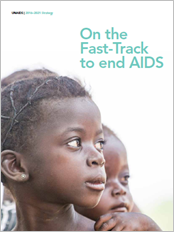GENEVA, 12 December 2016—At its 39th meeting, the UNAIDS Programme Coordinating Board welcomed the significant progress made in the response to HIV and stressed the need for sustained investment, strengthened commitment, partnerships and innovation to enable more countries to accelerate the delivery of services to end the AIDS epidemic by 2030.
In his opening address, the Executive Director of UNAIDS, Michel Sidibé, took stock of a momentous year for the AIDS response, during which access to antiretroviral therapy expanded to more than 18 million people and more countries adopted a Fast-Track response to ending the AIDS epidemic by 2030. A Fast-Track response includes a set of measurable targets that must be reached by 2020 in order for the world to be on course to end the AIDS epidemic by 2030.
Mr Sidibé underlined the need to continue to respond to the underlying issues that increase the vulnerability of people to HIV infection, particularly specific groups of people, including young women and adolescent girls and key populations, such as sex workers, transgender people, gay men and other men who have sex with men, prisoners and people who inject drugs. He announced plans for a new prevention coalition across different initiatives and among different leaders, implementers and community representatives committed to closing the prevention gap.
Despite the progress made in responding to HIV, Mr Sidibé warned of emerging global challenges that threaten to blow the Fast-Track response off course.
“It is essential that countries continue to have access to long-term, predictable and sustainable resources,” said Mr Sidibé. “If this is not the case, they will not be able to sustain and accelerate their responses to HIV and there could be a rebound of the AIDS epidemic in the coming years.”
During its three-day meeting, the Board noted the shortfall of funding commitments to support UNAIDS’ work and emphasized the need for the Joint Programme to be fully funded. At the same time, the Board called for the intensification of efforts to eliminate new infections among children and keep their mothers alive, so as to reach the targets set out in the 2016 Political Declaration on Ending AIDS and the Start Free Stay Free AIDS Free framework. The Board welcomed the successful replenishment of the Global Fund to Fight AIDS, Tuberculosis and Malaria and called for increased investment in community-based health service delivery and in civil society partners involved in the AIDS response, as well as for the strengthening of other measures designed to enhance community involvement.
The Board emphasized that community leadership will become even more important under the Sustainable Development Goals, which require inclusive responses and reaching the people most at risk of being left behind. Community responses have been in the vanguard of the AIDS response from the very beginning, but are not a substitute for national responses; rather, they constitute an integral component of evidence-informed national implementation plans, in particular for a Fast-Track response.
During the dedicated thematic day, the Board focused on the state of the epidemic among people living with HIV and at risk of acquiring HIV aged 50 years and above, the impact of ageing with HIV and related health and social sector responses. There was broad consensus for the need to support programmes and health system structures to comprehensively meet the needs of a growing number of people living with HIV who are aged 50 or over.
Representatives of Member States, international organizations, civil society and nongovernmental organizations attended the meeting, which was chaired by Switzerland. Ghana served as Vice-Chair and Ecuador as rapporteur.
The UNAIDS Executive Director’s report to the Board and the Board’s decisions can be found at unaids.org.
UNAIDS
The Joint United Nations Programme on HIV/AIDS (UNAIDS) leads and inspires the world to achieve its shared vision of zero new HIV infections, zero discrimination and zero AIDS-related deaths. UNAIDS unites the efforts of 11 UN organizations—UNHCR, UNICEF, WFP, UNDP, UNFPA, UNODC, UN Women, ILO, UNESCO, WHO and the World Bank—and works closely with global and national partners towards ending the AIDS epidemic by 2030 as part of the Sustainable Development Goals. Learn more at unaids.org and connect with us on Facebook, Twitter, Instagram and YouTube.



